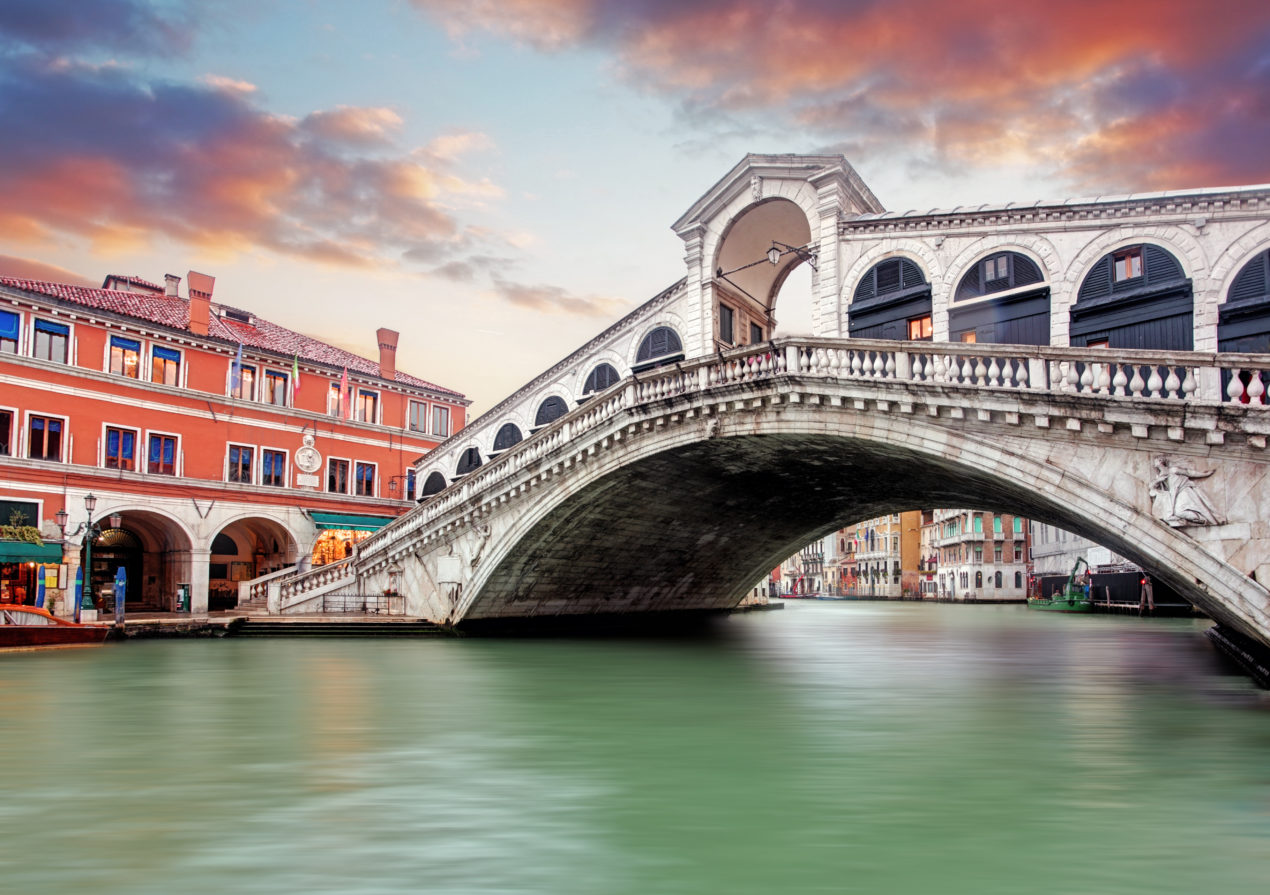How to Spend Three Fabulous Days in Venice
A three-day visit to Venice gives you a flavorful taste of this float-on-water, impossibly beautiful city.
I love Venice and go there as often as I can. In three days, you won’t see everything, but you’ll see a fair bit and, most importantly, you’ll whet your appetite (forgive the pun!) to return.
My suggestions for three days in Venice include plenty of time for slowing down and enjoying yourself. You can’t see everything, so don’t even try. Instead, focus on my suggested artsy highlights and still have plenty of energy left over for wandering.
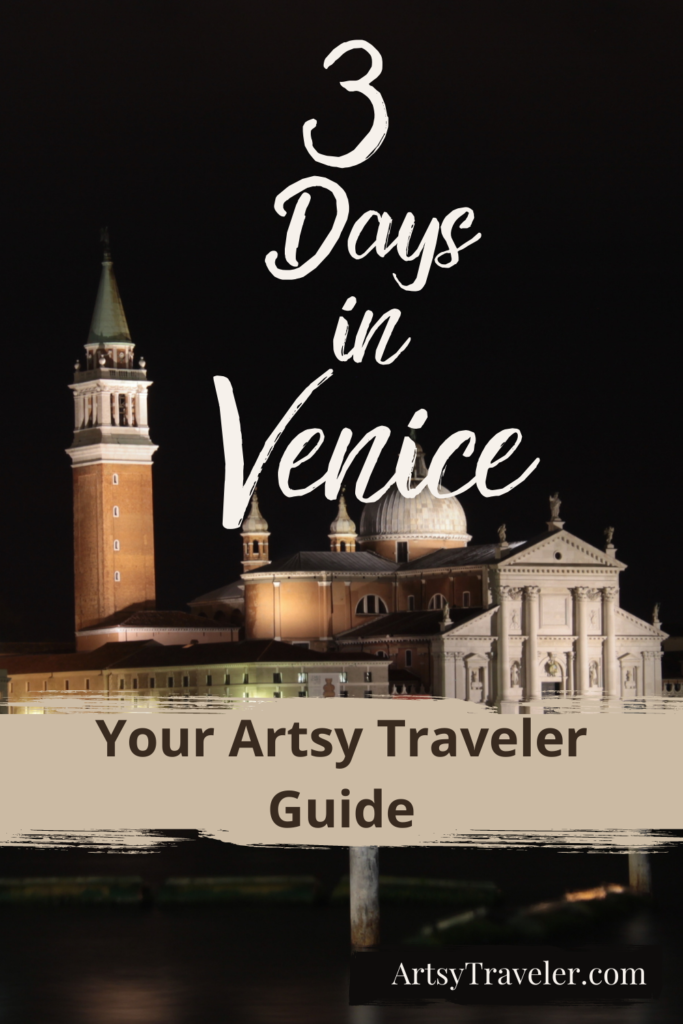
Best of Venice at a Glance
- Getting lost, especially at night
- Touring the Peggy Guggenheim Foundation
- Enjoying an evening concert (Vivaldi’s the home town boy here)
- Taking a gondola ride
- Staying at the San Teodoro Palace
- Taking an Art & Culture Tour of the Dosodoro
Venice is probably the most “wanderable” city I’ve ever visited.
Definitely avoid popping into Venice for a day, or worse, an afternoon. It’s better not to visit at all than to end up being jostled around Piazza San Marco (St. Mark’s Square) with thousands of other sweaty, rushed tourists.
You’ll come away with a negative view of Venice, and that would be a terrible shame!
I’ve met people who visited Venice for an afternoon from a cruise ship and couldn’t say anything good about the place, calling it hot, crowded, rude, and over-hyped. That makes me want to weep!
Venice is so much more than over-priced coffees on the St. Mark’s Square and gondola traffic jams on the Grand Canal.
- It’s wandering dark calles late at night when the only sounds are your footsteps on the cobblestones and the swish of water against stone.
- It’s early morning strolls to take photos of the peculiar Venetian light glinting off bobbing gondolas.
- It’s a bar hop to sample bàcari and cicchetti and maybe even meet a few Venetians.
- It’s quiet canals gleaming in the late afternoon sun with nary another human soul in site.
- And it’s full of wonderful, heart-breakingly lovely art.
Why I Love Venice
Of all the cities I’ve been to, Venice is my favorite. The first time I visited, I couldn’t stop laughing for the first fifteen minutes of our ride on the vaporetto (water bus) from the train station along the Grand Canal to our hotel.
I just couldn’t believe that such a place existed on Earth, that Venice was real.
But Venice is real, and Venice is special.
Quiet side canals glimmer in the luminous Adriatic light, buildings with exotic facades slowly sink into the mud, world-class museums and art galleries abound, peaceful piazzas and bustling piazzas beckon, gondolas glide and water taxis and water busses churn up and down the Grand Canal, and the music of Vivaldi wafts into the night air.
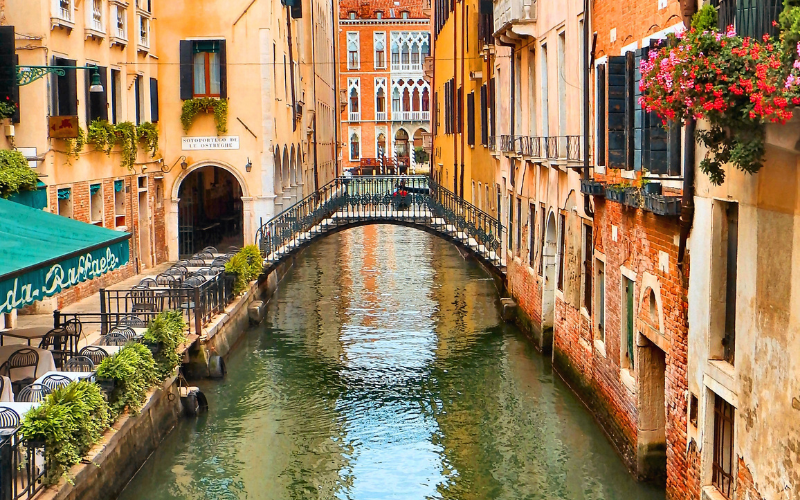
When to Visit Venice
In recent years, my favorite city was become horribly overcrowded. Massive cruise ships dock within sight of the Grand Canal and the cafés on the Piazza San Marco take rip-offs to a whole new level.
That said, go to Venice. Just be strategic about how and when you visit.
Floods in winter are often a serious problem, and summers can be hot and crowded.
I’ve stayed in Venice in both spring and autumn and recommend both seasons. You’ll still encounter crowds, but the weather will be bearable. Just bring lots of mosquito repellent!
A Three-Day Venice Itinerary
Here’s how I suggest you spend your time as an Artsy Traveler with two full days and three nights in Venice.
Day 1 in Venice
Arrival in Venice
Arrive around lunchtime and make your way to your hotel. If you’re driving, park in the Tronchetto Car Park. The rates are fairly reasonable and the car park has a station on the Venice People Mover, an automated tramway that takes you quickly into Venice.
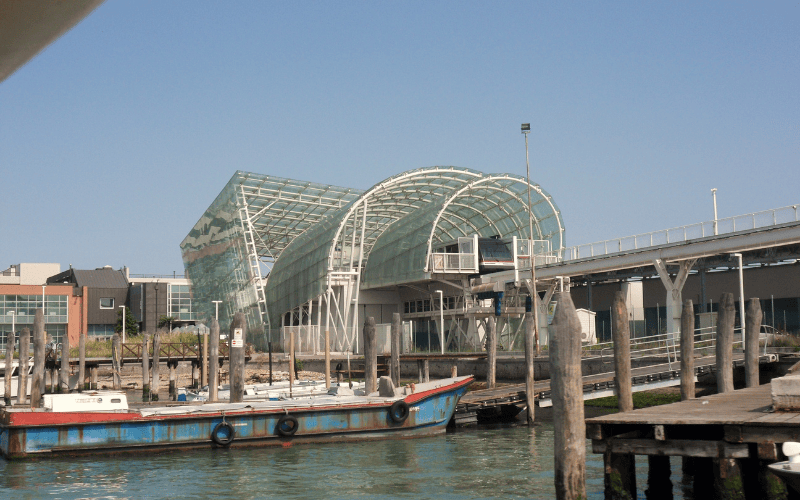
I wouldn’t waste time parking on the mainland. You’ll save a bit of money, but you’ll also waste a fair bit of time getting into Venice itself. Save your energy for sightseeing! Here’s a comprehensive overview of parking options in Venice.
If you’re taking the train, you’ll arrive at the train station and then, depending on where your hotel is located, hop on a vaporetto–the Venice version of a bus.
Getting Around Venice
The two main ways to get around Venice is by riding the vaporetto–a quintessentially Venetian experience–and walking. You could also take water taxis, but they are super expensive.
I’ve only taken one once from my place near the Grand Canal back to the Tronchetto Car Park at the end of a week in Venice to attend one of Gregg’s art exhibitions. We had a large box of his paintings in addition to our luggage and did not want to wrangle everything on to and off the people mover.
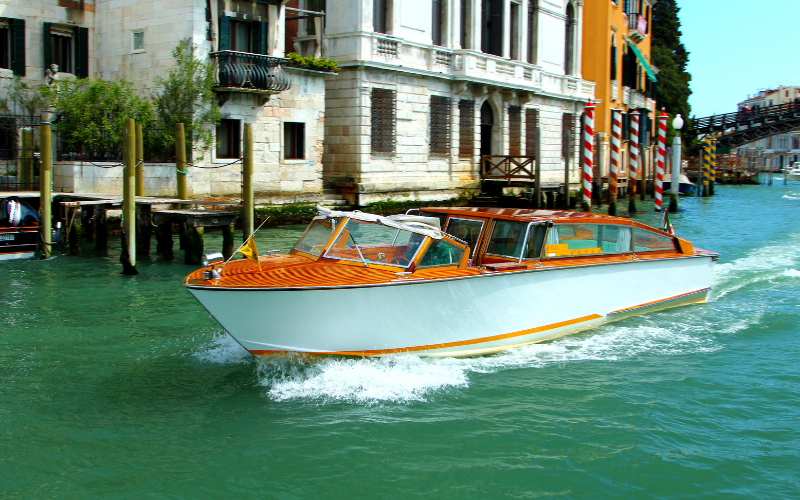
Sometimes, saving your legs and your sanity is worth the extra cost of a water taxi. But most of the time, you’ll get everywhere you need to go in Venice either by walking or by taking the vaporetto. Also, even when it’s packed to the gunnels, a ride on the vaporetto is fun!
Buy Tickets in Advance for the Vaporetto
A single ride on a vaporetto costs €9.5! That’s waterway robbery. Fortunately, you can buy a City Pass from the Venezia Unica website CityPass website that includes public transit and entrance to various Venice sites or you can just buy a transit pass for one, two, three, or seven days.
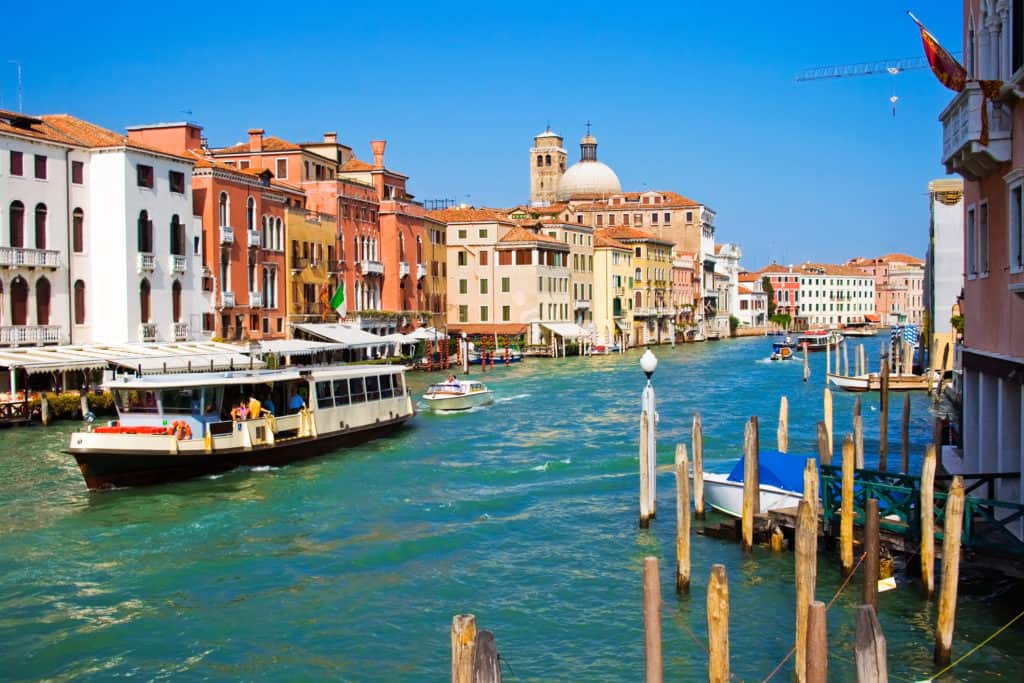
I suggest buying the three-day pass and using it on Days 1, 2, and 3. On the morning of Day 4 when you’re making your way back to your car, either walk, depending on where you’re staying, or splash out for a single ticket.
I bought a seven-day travel card for €60. Since my apartment was close to the Grand Canal, I used the vaporetto several times a day to get around and to travel to Burano and Murano. Buy the Venice Travel Card at the ticket-vending machines located at the largest vaporetto stops or online before you arrive (most convenient).
And depending where you’re staying in Venice, you may not even need to ride the vaporetto. On my latest trip, I stayed at the San Teodoro Palace right next to the Rialto Bridge, which is about as central a location as you can get. I was able to walk everywhere I wanted to go.
Areas to Stay in Venice
I suggest you stay in the Dosoduro area across the Grand Canal from Piazza San Marco or the area between the Rialto Bridge and the train station. I’ll talk more about hotels later. For now, drop your bags if your room isn’t ready and set out for your first stop.
Activities on Day 1 in Venice
Here’s what you’ll have time to do on your first afternoon and evening in Venice:
- Visit the Peggy Guggenheim Museum
- Walk to and cross the Rialto Bridge
- Visit Piazza San Marco as the sun is setting and the crowds have thinned
- Take a traghetto back across the Grand Canal
- Dine at a small trattoria near your hotel
Here are the details!
Visit the Peggy Guggenheim Museum
I seriously love this museum. Located right on the Grand Canal and accessed from the Dosoduro district, the Peggy Guggenheim Museum is a must-see for modern art lovers. Peggy Guggenheim was quite the gal in her day. She knew just about every famous modern artist in Europe in the 1930s and 1940s and amassed an amazing collection of their art.
You’ll find works by Picasso, Kandinsky, Miró, Braque, Giacometti, Klee, Magritte, Dali, Pollock, de Chirico, Brancusi, Braque, Duchamp, and Mondrian.
The museum is located in Peggy’s renovated Venetian palazzo. Wander the cool halls to revel in the fabulous collection and then go outside to enjoy a stunning panoramic view of the Grand Canal.
On your first day in Venice, this really is the place to come to get your first Venetian hit.
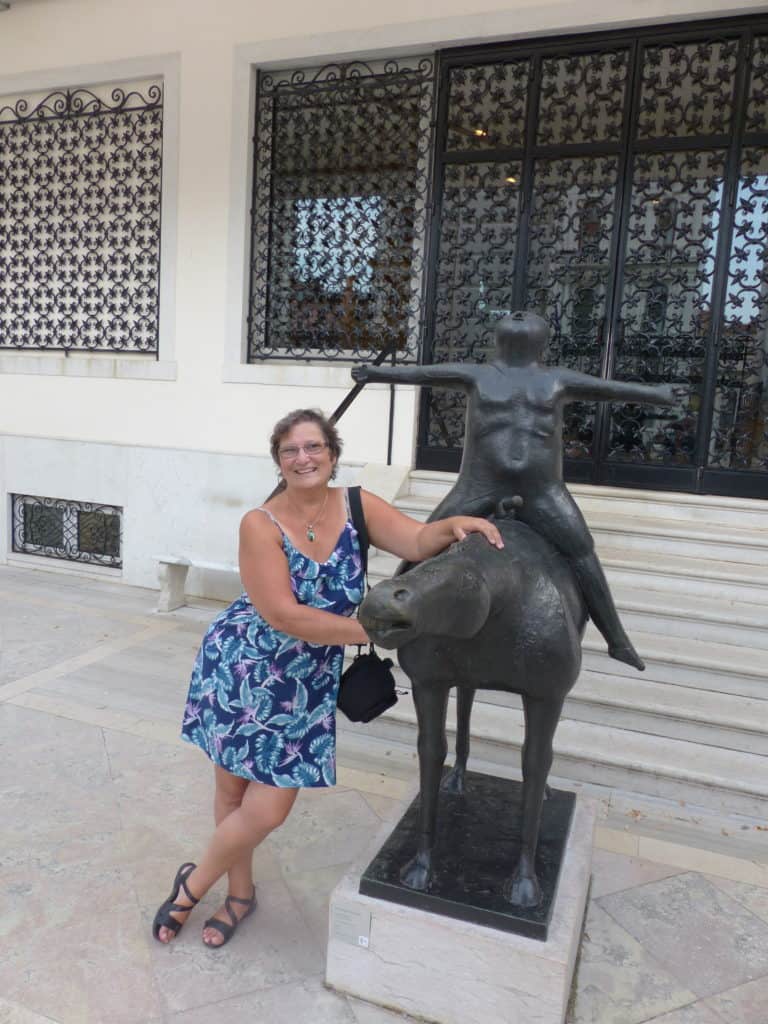
You can buy advance tickets (recommended in peak season) here.
Cross the Rialto Bridge
The Rialto Bridge is one of Venice’s most iconic sites and as such it is often heaving with tourists. Avoid crossing it during the day, but definitely cross it at least once or twice during your visit to Venice.
Since it’s one of the very few bridges across the Grand Canal, you can’t miss it!
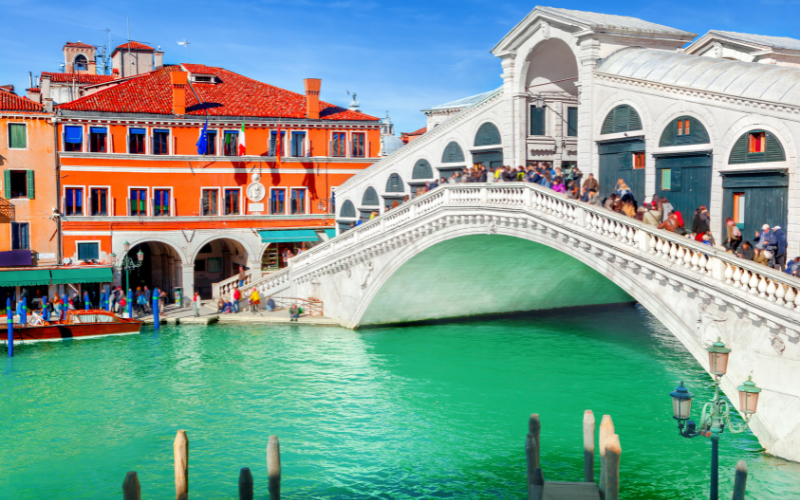
Visit Piazza San Marco
Take your time and wait until the sun is setting and the crowds have dissipated, and then make your way to Piazza San Marco. Called the drawing room of Europe by Napoleon, the Piazza San Marco lives up to the hype, even when seething with tourists.
But it’s better when it’s not too crowded.
Another option is to visit it very early in the morning (see my suggestions for Day 3) or late at night after dinner to really see and appreciate it.
In the evening, you can dance to the music coming from the posh cafés that line both sides of the piazza. Scare away a few pigeons and enjoy.
I have occasionally splurged on a cup of coffee at one of the cafés (the prices are truly eye-watering), but the people-watching is worth the price and hey, you’re in Venice.
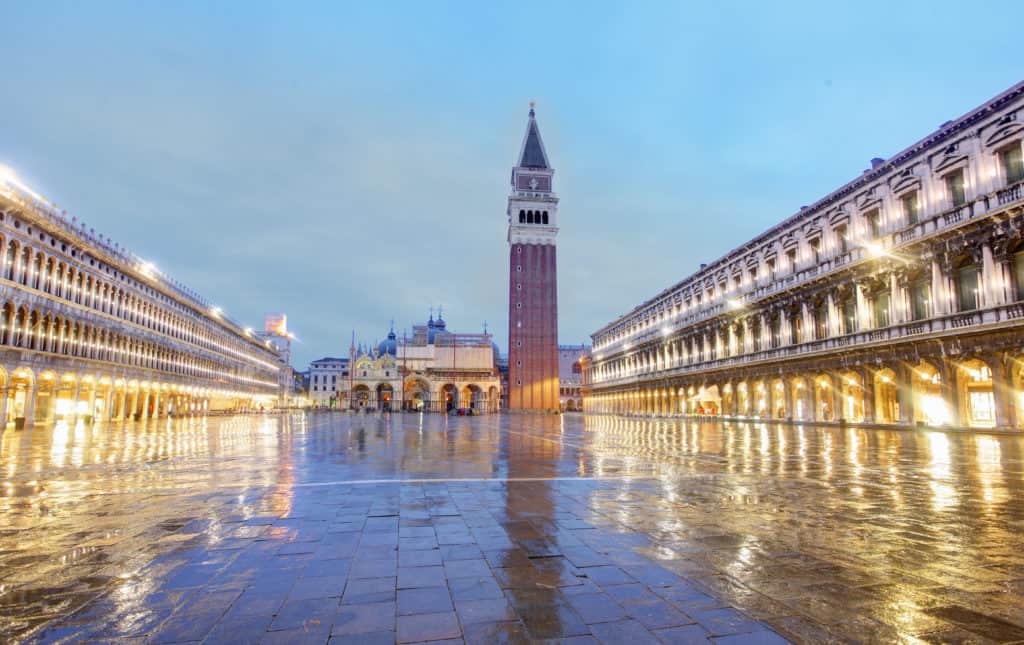
Take a Traghetto Back Across the Grand Canal
You have to ride a traghetto at least once while you’re in Venice. These fairly large and plain gondolas ferry people across the Grand Canal from various points.
One option is to catch it from the Santa Sofia boat pier not far from Piazza San Marco and go across to the Rialto Fish Market. The ride is fast, cheap, and great fun.
It’s not exactly a replacement for a “real” gondola ride, but it’s a great budget option, and at least you can say you rode in a gondola.
On the other hand, I do suggest you splurge on a gondola ride (see Day 3 suggestions).
Dine at a Small Trattoria
Check restaurant reviews and find a small restaurant near where you are staying. Avoid the more touristy restaurants at or near Piazza San Marco.
My most memorable meal in Venice was at La Zucca, a small osteria on a side canal on the Dorsoduro side of the Grand Canal. Get reservations in advance (advisable everywhere in Venice) and enjoy!
Day 2 in Venice
On your first of two full days in Venice, use your morning energy for sightseeing (fewer crowds) and then spend the afternoon on Murano. Here’s what I suggest:
- Visit the Accademia Gallery
- Visit Murano for a glass-blowing demonstration and to shop for glass
- Go to a concert of baroque music in the evening
Here are the details!
Activities on Day 2 in Venice
Visit the Accademia Gallery
You’ll find plenty of Renaissance and Baroque biggies in the Accademia in Venice (Gallerie Accademia). Works by such masters as Veronese, Tiepolo, Bellini, and Titian grace the walls of this very walkable and enjoyable museum. It’s not too big and in my experience isn’t usually that crowded.
That said, get tickets in advance to avoid line-ups, just in case. Check the gallery’s website for details. Or consider a private art & culture tour in the Dosodoru. Here’s an option from GetYourGuide:
Take the Vaporetto to Murano
Using your vaporetto pass, hop on the vaporetto for a trip across the lagoon to the lovely island of Murano. It’s quite a long voyage and the lagoon can be choppy.
If you can, snag a seat outside to guard against seasickness.
Murano is the glass-blowing island and allegedly the best place to buy the distinctive Venetian blown glass. There are certainly plenty of shops there and the prices do seem to be a bit more reasonable than the prices at the tourist joints in Venice itself.
Enjoy a Glass-blowing Demonstration
Upon arrival, head for a glass-blowing demonstration. It’s put on for the tourists, and our hand-scarred guy looked kind of bored as he dutifully blew, rotated, heated, and smashed a variety of glass ornaments.
But I enjoyed the demonstration and recommend it to see how glass blowing is done.
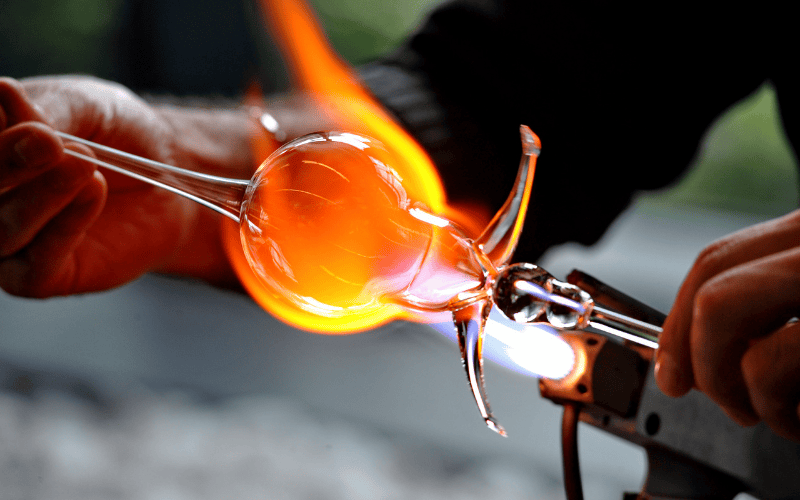
Browse the Shops
Make your way down some fairly nondescript streets to the main shopping street bisected with a small, straight canal arched over with several small bridges. On both sides of the canal, shop after shop after shop marched a good three blocks in both directions—each one crammed to the ceiling with glass.
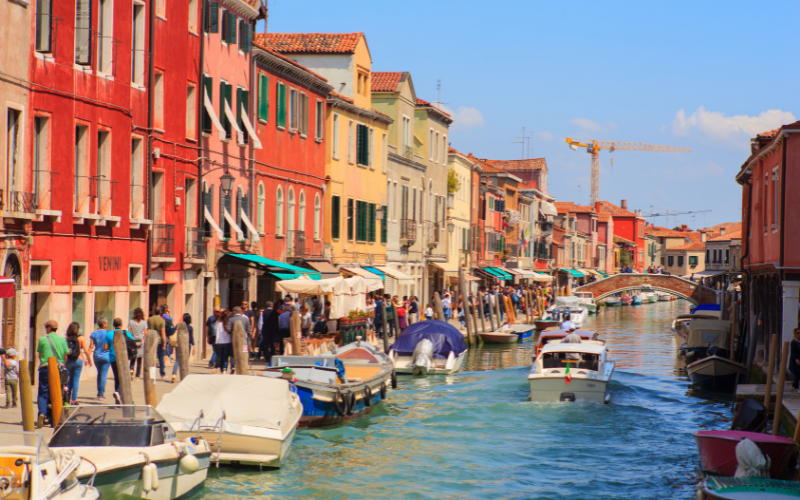
Dozens of storefronts twinkle with heaps of glittering, glaring, glinting glass—swoopy vases and finely spun figures, paperweights, pendants, chandeliers, glasses, earrings, pitchers, plates, bowls, beads.
Every store advertised that their glass is authentic, made on Murano, not in China like 80% of all the other glass for sale in Venice.
Enjoy Lunch Along the Canal in Murano
After shopping, enjoy a leisurely lunch at one of the canalside restaurants in Murano and then hop back on the vaporetto to return to Venice.
After your trip to Murano, either relax in or near your hotel for the afternoon or just keep wandering. Venice is endlessly fascinating.
I love strolling alongside the canals, never knowing what’s around the next corner. Sometimes, I find a bustling street, at other times, nothing is moving except a cat stretching on a boat moored in the canal.
Gregg loved our visit to Murano and created several pieces inspired by glass blowing. Here’s my favorite (also featured in our collaboration Pastel & Pen: Travels in Europe):
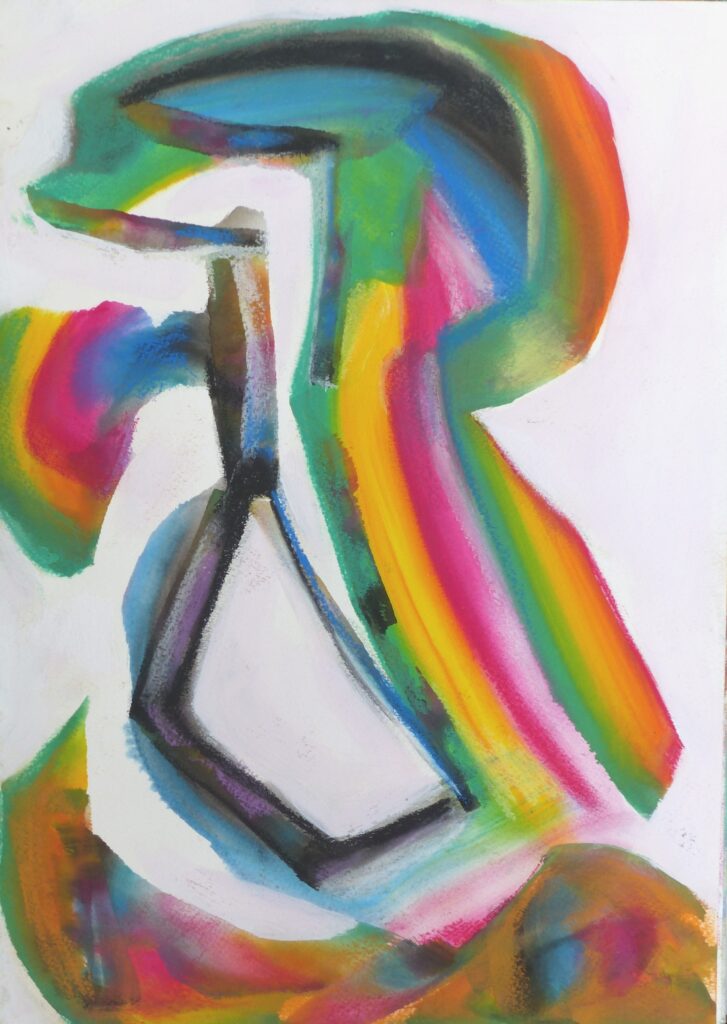
Attend a Concert of Italian Baroque Music
A highlight of a trip to Venice is attending a concert of Italian baroque music. Vivaldi is the hometown boy here and you shouldn’t have much trouble finding a concert featuring his Four Seasons. by Italian baroque
One concert we attended was held in a baroque church with a ceiling painted by Tiepolo.
Look online for concert schedules and purchase tickets in advance if you can. Afterwards, float out into the warm Venetian evening (depending on the time of year!) and find another small trattoria for dinner.
I attended this concert, and it was marvelous.
Get Lost in Venice After Dark
And after dinner, keep wandering. Getting lost after dark in Venice is one of Europe’s best travel experiences.
In fact, I put getting lost in Venice at the top of my list of must-do activities because first, getting lost is unavoidable (even with GPS on your phone), and second, you’ll never be lost for long.
Some of my fondest Venice memories are of strolling alongside dark canals in the evening (violent crime is very rare in Venice), not knowing if I was going in the right direction and not caring.
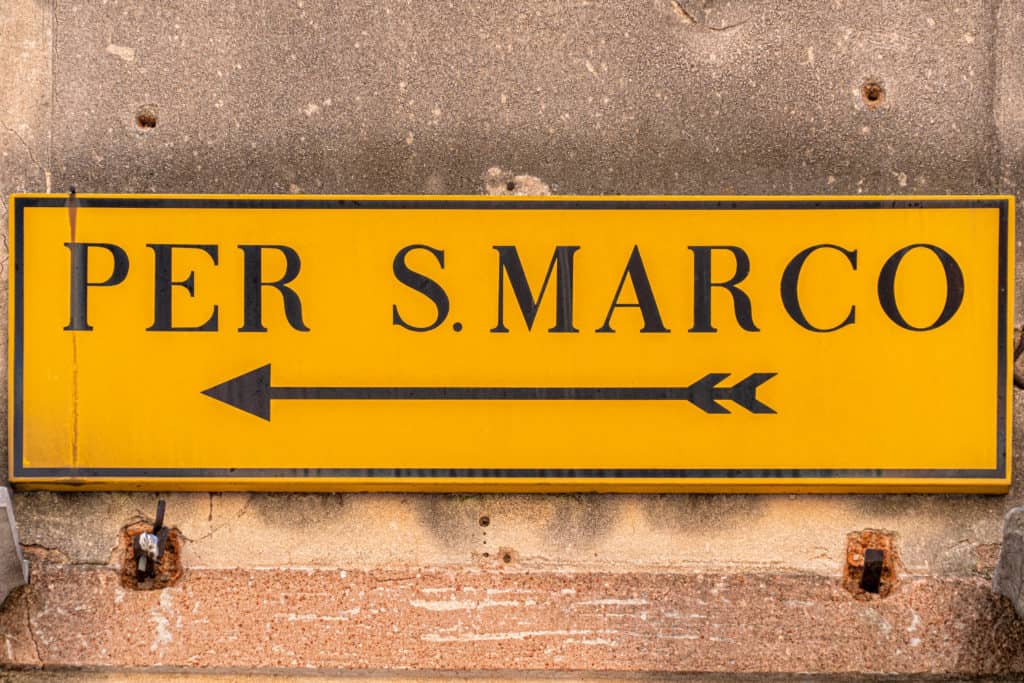
Venice is an island; you can’t fall off. With the world asleep and the crowds long gone, Venice at night is one of the most magical places on Earth.
Walk until you come to one of the ubiquitous signs pointing to San Marco or Rialto or Ferrovia (train station) and get your bearings. You could also ask someone for directions, but chances are they’re tourists and also lost.
Day 3 in Venice
Get going bright and early to take in two of the most iconic sites of Venice, again before the crowds start to gather. Here’s an overview of Day 3:
- Tour the Duomo and the Doge’s Palace
- Wander and get lost some more
- Take a gondola ride after dark
Activities on Day 3 in Venice
Tour the Duomo and Doge’s Palace
Both are crowded, and both are must-sees. Get your tickets ahead of time and go early or late. Several times I’ve bypassed long lines of hot and tired tourists waiting to get into the Doge’s Palace.
Breeze past them with your pre-purchased ticket.
The sumptuous public rooms of the Doge’s Palace will show you just how powerful Venice was back in the day.
A more sobering attraction are the dungeons reached by crossing the Bridge of Sighs, so called because prisoners who crossed it got their last glimpse of the world before being shut away and usually executed. Cheerful stuff.
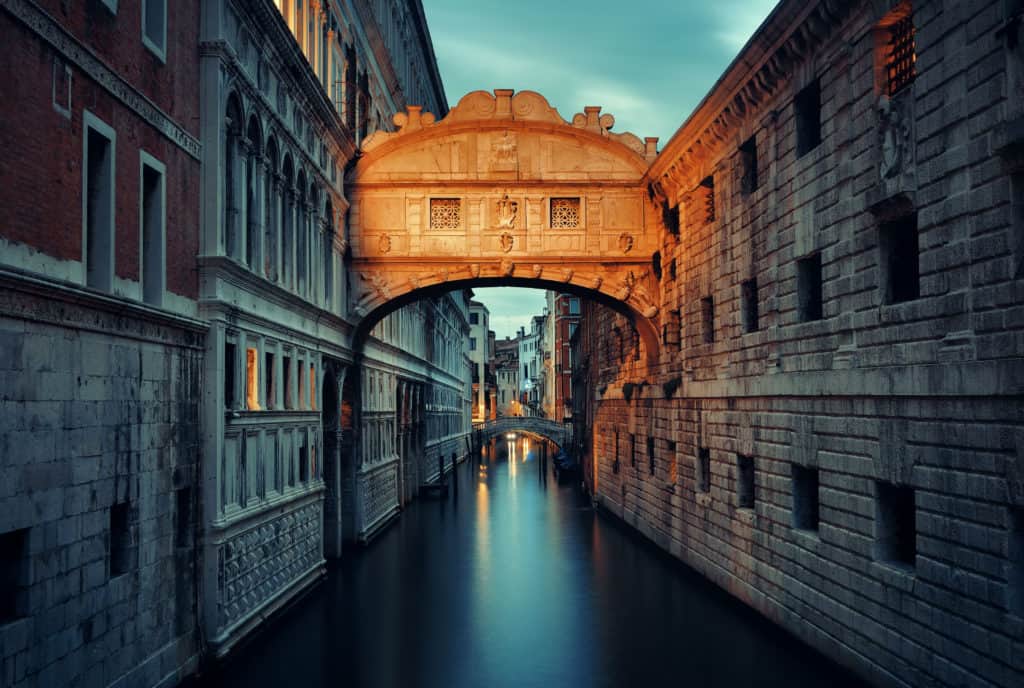
Leave Piazza San Marco before it gets too crowded and spend the afternoon wandering the back streets. Shop for souvenirs if you haven’t already bought your quota in Murano, relax at a sidewalk cafe in a small piazza, watch the people go by, and enjoy life.
What’s the hurry? You’re in Venice!
Take a Gondola Ride at Dusk
Yes, it’s expensive and kinda touristy but it’s also super romantic and relaxing. You’ll be taken into canals you may not have seen from the street, and if you’re lucky, you’ll hear a few gondoliers break into song.
Occasionally, I’ve seen gondola traffic jams. To avoid them (not at all romantic!), go later.
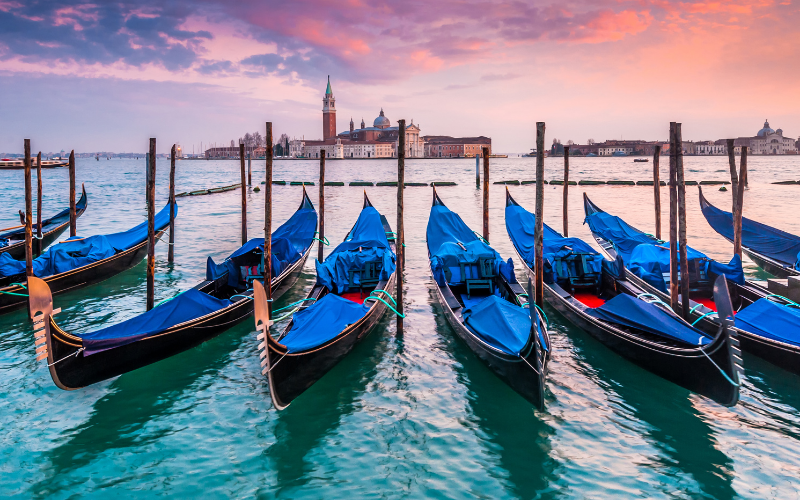
At the time of writing, a daytime gondola ride costs 80 Euros for 40 minutes. After dark, the price rises to 100 euros, but in my opinion, going at night is the best.
Six people fit in a gondola so you could share, depending on who you are with and whether romance is on the cards!
Here is Gregg and me on one of two gondola rides we’ve taken during our trips to Venice. We loved every minute of it!
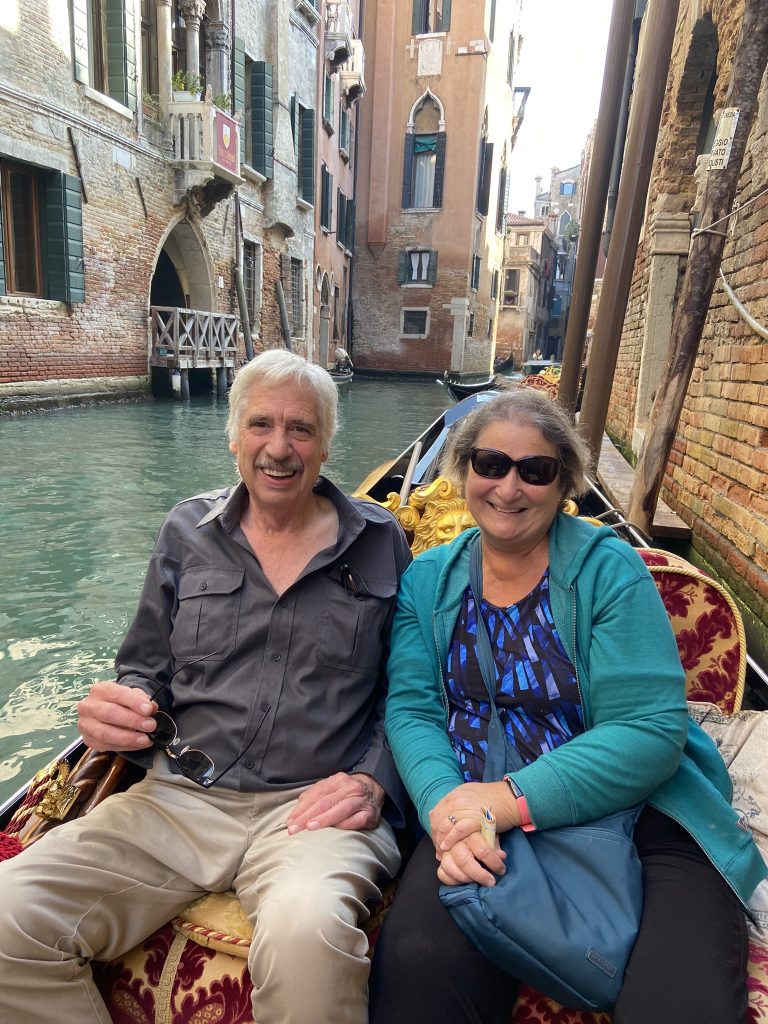
Tours of Venice
Here’s a selection of artsy sightseeing options in Venice with links to fast-track tickets.
Walking Tours of Venice with GuruWalks
How about a walking tour of Venice? GuruWalks has some good options:
Staying in Venice
Venice deserves at least three nights and preferably more so you can settle in and enjoy being a temporary Venetian. If time allows, rent an apartment and stay for a week.
My most cherished memories of Venice are the ten days I spent there a few years back while Gregg had an exhibition of his paintings in a gallery overlooking the Grand Canal.
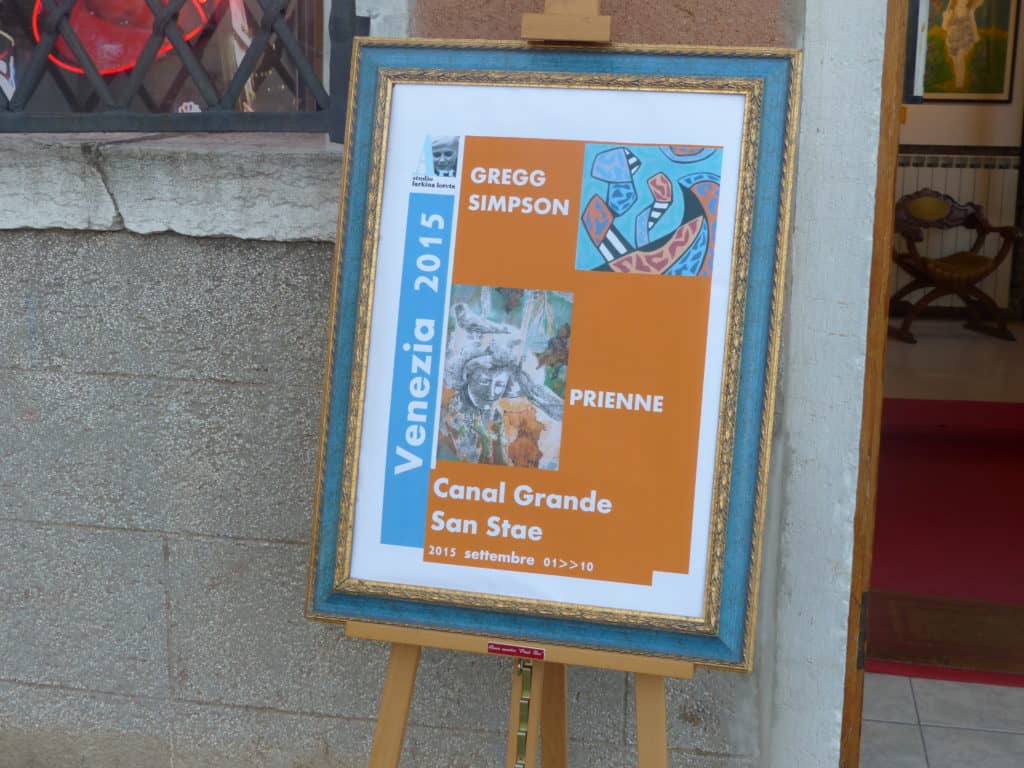
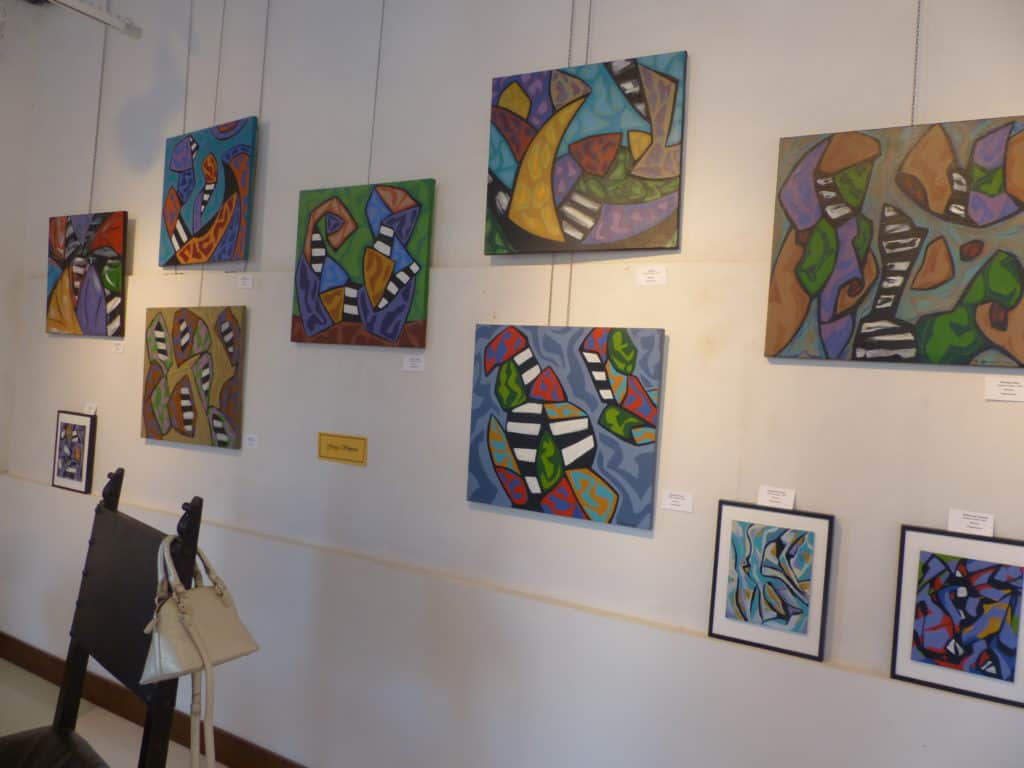
I spent hours just wandering the city, staying well clear of the heaving masses in Piazza San Marco and taking my time getting to know this most extraordinary city.
For the apartment stay, I chose a place just off the Grand Canal about a five-minute walk from the train station. The neighborhood was quiet and close to a piazza that every evening spilled over with local Venetians enjoying the air and watching their children play.
If you have the time, rent an apartment in Venice and stay for a week. Live like a local, not that you’ll see many locals these days. Venetians are moving out of the city at an alarming rate. But at least you’ll experience shopping in tiny local grocery stores and get to know your way around a neighborhood.
As mentioned earlier, consider staying in the Dorsoduro district across the Grand Canal from the Piazza San Marco. I recommend you avoid the area immediately adjacent to Piazza San Marco. Hotels there can be expensive, and the tiny streets in the area are wall-to-wall tourists during the day.
Accommodation Suggestions
Here are suggestions I’ve stayed in Venice.
San Teodoro Palace: This one-bedroom apartment is huge by Venice standards and located steps from the Rialto Bridge in a very lively and touristy area.
Ca’ Mirò: Settle into this two-floor apartment in a quiet area of Venice not far from the train station and become a temporary Venetian. It’s gorgeous.
Hotel Canaletto: We stayed there a few years ago and loved it. The rooms were small, but that’s par for the course in Venice. The location, just 200 meters from Rialto Bridge, was fantastic as was its situation on a charming side canal.
Hotel Messner is a more modest option, located in the Dorsoduro neighborhood close to the Peggy Guggenheim Museum. It was quiet, and the area was peaceful and uncrowded, particularly at night.
For other options in Venice, check the map below. Resist the temptation to stay on the mainland. The savings will be minimal once you take into account train fares and your time.
Stay in the middle of Venice and enjoy this unique city.
Booking.comConclusion
Include Venice in your trip to Italy if at all possible. With a bit of planning and some strategic dodging, you can easily avoid the crowds and find plenty of peaceful areas to enjoy.
Venice is a city for dreaming. Give her time and she’ll reward you.
Looking to travel elsewhere in Italy? Here are some more posts to check out:
